Business
NNPC’s trading surplus increases by 23% to N43.57bn in April

The Nigerian National Petroleum Corporation (NNPC) has declared a N43.57 billion trade surplus for April 2021.
This is a 23.64 percent increase over the N35.24 billion surplus reported in the month of March 2021.
Kennie Obateru, the Corporation’s Group General Manager, Group Public Affairs Division, revealed this in a statement while presenting the April 2021 edition of the NNPC Monthly Financial and Operations Report (MFOR) in Abuja over the weekend.
Trade surplus or deficit is computed by subtracting the expenditure profile from the revenue for the period under consideration.
Details from the report shows operation revenue in April 2021 grew by 17.73 percent, or N80.67 billion, compared to March 2021, to N535.61 billion.
Similarly, expenditure grew by 17.24 percent or N72.34 billion for the month to N492.05 billion.
Its expenditure as a percentage of revenue also stood at 0.92%, unchanged from the month of March.
The report released also attributed the rise in trading surplus to the activities of the Corporation’s Upstream subsidiary, the Nigerian Petroleum Development Company (NPDC), such as crude oil lifting from OML 119 (Okono Okpoho) and OMLs 60, 61, 62, 63 (Nigerian Agip Oil Company), as well as increase in gas sales.
The positive outlook was further consolidated by the robust gains of two other subsidiaries namely: Duke Oil and the National Engineering and Technical Company (NETCO).
In the Downstream, to ensure uninterrupted supply and effective distribution of fuel across the country, a total of 1.67billion litres of Premium Motor Spirit (PMS) translating to 55.79mn liters/day were supplied in the month under review.
Other information from the reports reveals a 34.29 percent decrease in the number of pipeline points vandalized from 70 in March 2021 to 46 in April 2021.
Read also: For first time in 44 years, NNPC may declare dividend to Nigerians
The Port Harcourt area accounted for 54% of the vandalized points, the Mosimi area accounted for 46%.
In the Gas sector, a total of 209.27billion cubic feet (bcf) of natural gas was produced in the month under review, translating to an average daily production of 6,975.72million standard cubic feet per day (mmscfd).
For the period of April 2020 to April 2021, a total of 2,902.52bcf of gas was produced, representing an average daily production of 7,369.76mmscfd during the period.
Period-to-date production from Joint Ventures (JVs), Production Sharing Contracts (PSCs) and NPDC contributed about 62.07%, 19.95% and 17.98% respectively to the total national gas production.
In terms of natural Gas off-take, commercialization and utilization, out of the 206.40bcf supplied in April 2021, a total of 126.83bcf of gas was commercialized consisting of 42.92bcf and 83.91bcf for the domestic and export markets respectively.
This translates to a total supply of 1,430.90mmscfd of gas to the domestic market and 2,976.94mmscfd of gas supplied to the export market for the month.
This means that 61.45 percent of the average daily gas generated was marketed, with the remaining 38.55 percent being re-injected, utilized as upstream fuel gas, or flared.
The gas flare rate for the month under consideration was 9.74 percent (i.e. 670.19mmscfd), compared to an average gas flare rate of 7.42 percent (i.e. 542.22mmscfd) from April 2020 to April 2021.
Also a total of 795mmscfd was delivered to gas-fired power plants in the month of April 2021 to generate an average power of about 3,416 MW.
Join the conversation
Support Ripples Nigeria, hold up solutions journalism
Balanced, fearless journalism driven by data comes at huge financial costs.
As a media platform, we hold leadership accountable and will not trade the right to press freedom and free speech for a piece of cake.
If you like what we do, and are ready to uphold solutions journalism, kindly donate to the Ripples Nigeria cause.
Your support would help to ensure that citizens and institutions continue to have free access to credible and reliable information for societal development.
























